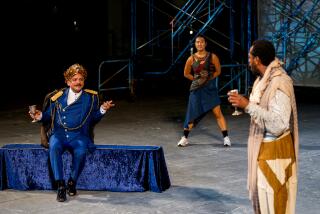‘Kitschy’? Did We See Same ‘Trojan Women’?
- Share via
I find the vitriolic criticism unleashed by Laurie Winer on the production of Euripides’ “The Trojan Women” unjustified and based on misunderstandings about the performance conventions of Greek tragedy (“ ‘Trojan’ Tale Drowns in Excess,” Calendar, June 12). There are three points that Winer attacks: the music (by Mimi Seton) and choreography (by Holly Harbinger); the adaptation by the director (Michael Arabian), and the “gimmicks” in the staging.
Before looking at some of Winer’s specific objections, I must say that the overall impression of “The Trojan Women” that I received is one of respect for the original material. Nothing Arabian does with the scenic elements or staging violates the artistic integrity of Euripides’ play. This restraint is in contrast to the production of Aeschylus’ “The Persians,” directed by Peter Sellars at the Mark Taper Forum in 1993, which shamelessly distorted the words and intentions of the playwright to make a vehemently anti-Gulf War statement.
Arabian makes the anti-war statement Euripides intended through many interesting effects, some of which succeed brilliantly. The experiment of staging the play on the lagoon and sandy shore of the CBS Studio lot evokes the beach where the Greek camp would be, resulting in riveting images.
To name a few: Hecuba discovered buried in sand; Poseidon rising from the depths opposite a sky-high Athena hovering above the audience; Helen floating to the shore in a blue capsule; the HMMWV (amphibious vehicle) roaring out of the lagoon with Menelaus at the helm; the blazing corpse of Andromache’s child, Astyanax, adrift on the waters. Helen’s entrance, which Winer ridicules, is a theatrical image associating Helen with the goddess of love, Aphrodite, who was born from the sea (witness Botticelli). Helen rises from the sea like her mentor who gave Helen as a prize to the Trojan prince Paris, thereby causing the Trojan War. Arabian’s staging of this moment is not “kitschy,” as Winer has it. On the contrary, it is arresting and meaningful.
*
The same can be said of his treatment of the Greek victors. In Euripides’ play, unlike “The Persians,” the Greeks are viewed as arrogant in victory and cruel to the defeated. Menelaus is the epitome of a male swaggerer whose first words, “I am the man” (Arabian’s version), are very close to the original “I am Menelaus.” The ease with which the bold adulteress, Helen, twists the cuckolded general around her little finger is one of the jokes of the original play. In such an otherwise relentlessly grim drama, Arabian and his actors wisely make the most of it.
As for the music and dance, it is not clear whether Winer objects to this particular score or to the general idea of music in Greek tragedy. If it is to the latter, Winer is way off the mark. Greek tragedy was almost entirely musical.
Today, the music and dance of the original are lost and must be either replaced by modern music or scrapped in favor of speech. When modern scores are commissioned, the results can be exhilarating. Strauss’ “Elektra” and Bob Telson’s “The Gospel at Colonus” are wonderful examples in widely different musical styles.
My hat goes off to Michael Arabian and his artistic team, who, without undo license or egotism, have created an entertaining Hollywood-under-the-stars production of a timeless anti-war play. To see Mariette Hartley’s richly textured and moving Andromache is alone worth the price of admission.
More to Read
The biggest entertainment stories
Get our big stories about Hollywood, film, television, music, arts, culture and more right in your inbox as soon as they publish.
You may occasionally receive promotional content from the Los Angeles Times.










